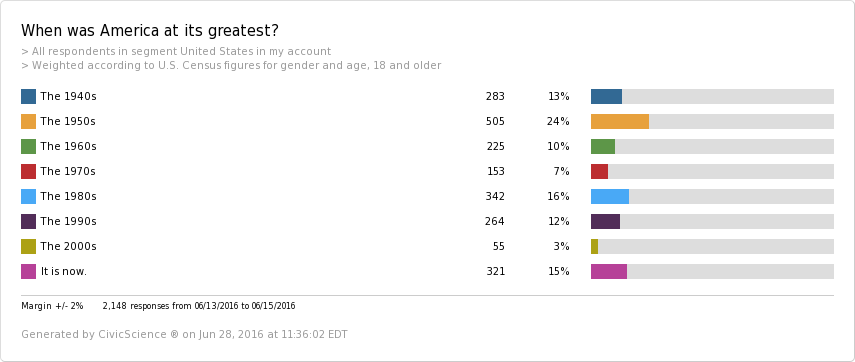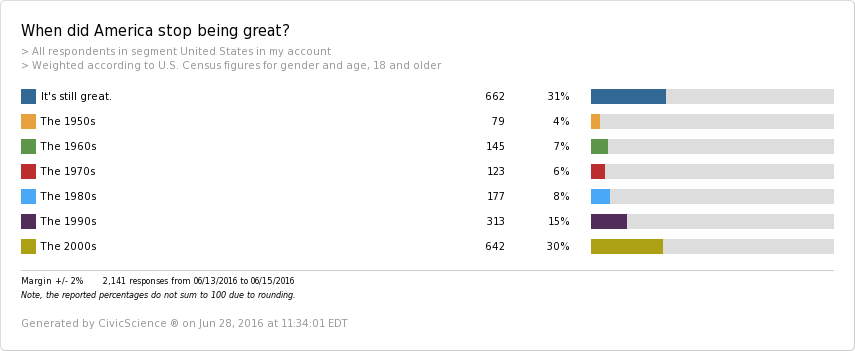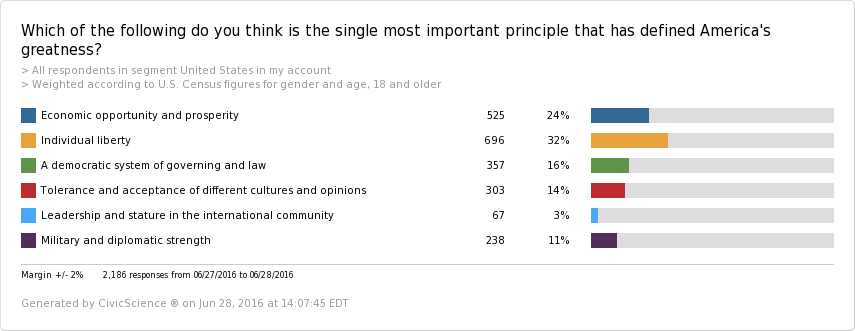Each 4th of July, my extended family converges on our peaceful mountain cabin, deep in the woods of rural Pennsylvania, far from the nearest cell phone signal, sushi restaurant, or Uber. Driving through the local town yesterday, I was struck by the number of American flags waving from every front porch – and the number of “Trump for President” signs sprouting from every yard. Here was an entire community celebrating their pride in the U.S.A., while embracing a political candidate who believes American greatness is a thing of the past.
Love him or hate him, Donald Trump has struck an undeniable chord with the American public. His pervasive campaign slogan, “Make America Great Again,” has driven a wedge between those who long for a bygone era of American prominence and those who believe Trump’s brand of politics will undo decades of social, cultural, and economic progress.
Implicit in Trump’s rallying cry is the notion that America was once ‘great’ but no longer is. Judging by his formidable public support – especially in towns like the one near our cabin – this must be a widely held notion.
All of it begs one pivotal question: When WAS America great, presuming it no longer is? So, we asked this question (well, a few questions, actually) to a representative sample of U.S. adults. The results were fascinating, to say the least.
We started with a simple question, designed to identify the decade in the last eighty years when America was at its greatest:

The winner by a decent margin was the 1950s, after America had emerged victoriously from World War II, economic prosperity was rampant, and our status as a world super-power was firmly established. Coming in second was the 1980s, with the third largest group saying that America is at its greatest today. As you would expect, the numbers vary widely by demographics (African Americans, for example, weren’t quite as fond of the 50s, to put it mildly) and political ideology. We’ll dive into that later.
We also asked a second question – because it’s feasible someone could still consider America to be “great” today, even if its greatness peaked sometime earlier. Trump’s provocative slogan implies that America’s greatness ended at some point. But when?

Unlike our first question, these results aren’t nearly as well-distributed. Two distinct front-runners can be seen. The largest number, by a 1-point margin, believe that America is, indeed, still great. The second-largest group believe America ceased being great sometime in the 2000s. The 1990s are a distant third.
Lastly, any question about when America was great (or not) requires some context. How do people really define or evaluate America’s greatness?

Like our first question, this one is fairly well-distributed. Individual liberty tops the list, with economic opportunity/prosperity, and the democratic system of government rounding out the top 3. All of our choices reached double digits with one exception – international leadership.
Seems reasonable enough, right? Ah, but this is 2016. And very little, if anything, is reasonable when it comes to U.S. politics. Behind all of these numbers are clear divisions, perspectives, and biases. Let’s dive in.
GENDER
Men and women don’t vary greatly on any of our questions. They’re almost identical in their opinions on when America stopped being great (if at all). Men are slightly more likely to say America was greatest in the 50s. Women are more likely to choose the 80s or 90s. When it comes to defining American greatness, women are much more likely to cite tolerance/acceptance, while men are more likely to choose military and diplomatic strength.
AGE
Here we see clearer correlations but not the ones you might expect. Baby Boomers are the most likely to believe America’s democratic system of government defines its greatness. They say America was greatest in the 50s or 60s but they’re also the most likely to say America is still great today. GenXers are the most likely to value individual liberty, least likely to say America is still great today, most likely to say we were greatest in the 80s, and the most likely to say our greatness ended in the 90s or 2000s. Millennials are the most likely to value American tolerance and acceptance and to believe that America was at its greatest in the 90s.
The most prevalent bias we see here: People consistently believe that America’s greatest decade occurred during their childhood years, regardless of the political leadership or policies of the time.
RACE
Again, we see some notable and explicable differences. Hispanics and African Americans are far more likely than Whites to believe America was at its greatest in the 90s. African Americans are also over 2X more likely than Whites or Hispanics to consider the 70s our greatest decade. Given the status of civil rights at the time, it should come as no surprise that minorities are much less likely to revere the 40s or 50s (White respondents are much more likely to choose these two). Hispanics are the most likely to say America stopped being great in the 90s. African Americans are the LEAST likely to say that America is still great today.
Why the differences? Perhaps because Hispanics were by far the most likely to attribute America’s greatness to economic opportunity and prosperity. The US economy was booming in the 90s and went sideways toward the end of the decade. African Americans, on the other hand, leaned more toward the tolerance and acceptance of different cultures and opinions, which is not the most prevalent virtue in today’s political environment.
PARTY AFFILIATION
If you’re looking for correlations, here’s where you’ll find the motherlode. It’s notable, if not sad, that people today are more identifiable by their political orientation than by their gender, age, race, or anything else. At 45%, Democrats are a whopping 2.5 times more likely than Republicans to say that America is still great today and over 4 times more likely to say America is at its peak greatness today.
About 1/3rd of Republicans, particularly the older ones, believe America was at its greatest in the 1950s. 59% of Republicans believe America stopped being great sometime in the 90s (19%) or 2000s (40%). In other words, when Trump supporters call for a return to the good ol’ days, they could be talking as recently as 2007.
What explains the big divide? At their core, Republicans and Democrats have vastly different ideas of what makes America great. For Democrats, the #1 answer was “tolerance and acceptance of different cultures and opinions,” while this was the second-to-last choice among Republicans. For Republicans, the top answer was “Economic opportunity and prosperity,” which was the fourth most popular choice among Dems. Republicans were also 3.5 times more likely to choose “Military and diplomatic strength.”
The only thing Rs and Ds have in common? “Individual liberty” and “A democratic system of governing and law” came in second and third, respectively, among both groups. Independents chose “Individual liberty” above all else.
WHAT DOES IT ALL MEAN?
There’s so much to unpack in all of these numbers, I’d love to hear your interpretation. What stood out to me, first and foremost, is that a full 70% of respondents and even 55% of Democrats do not believe America is “great” today. I don’t believe that for a minute. I saw enough American flags yesterday, pictures of parades and parties on Facebook, and fireworks in the sky to tell me that most people are still pretty fond of their country.
No, what I see in these numbers is just another symptom of our blind, divisive political environment. Every poll and every comment on social media is an invitation for people to make a strong statement at one extreme end of the spectrum or the other. “America stopped being great as soon as that damn Obama was elected,” say Republicans! “America stopped being great when that damn George Bush was in office,” say Democrats!
It’s simply not gratifying enough for someone to say, “Yeah, maybe America’s seen some better days, but it’s still pretty great overall.” That’s what I saw yesterday on the roads of rural Pennsylvania. If only that feeling could last beyond July 4th.
I guess, “Let’s Make America as Great as It Used to Be in 2007 or the 1950s,” doesn’t have the same ring to it.








